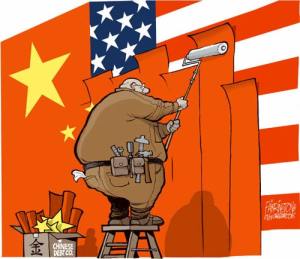The Sun Sets Due West

Geopolitical powers rise and fall. Lets understand why Europe seems to have even failed to become one.
The west experienced its first decline with the 1st World War, but western values and culture lived on through the ideological empires and their Cold War. The USA and the USSR had an essential role in promoting nationalism, centralised state, liberalism and materialism.
After two decades of Pax Americana, the decline of US hegemony might not be so dramatic were the other west faring well. But its not the case. Europe is still trailing behind the US in economic recovery. Stopping short of trying to federalize Europe, some steps to integrate it economically and financially would have been wise. Throughout the past decades however, Washington and Moscow have managed to divide and rule the old world. Excellent initiatives such as common regulation or the European Central Bank took Europe forward. But in any given crisis, Brussels was always superseded: it happened in Iraq, it was repeated in Georgia.
The postponement and even possible scrapping of projects of European (at large) interest such as the Nabucco pipeline or the A-400 transport aircraft, have to be attributed to the lobbying and savvy diplomacy of Russia and America. This in turn should be an eye opener to those end-of-history idealists who still believe Europe will forever live in peace, democracy and liberalism.
Other than disunity, the single most revealing feature of a declining power is its debt. Europe became indebted to the US after WW1 – exception being stalinist Russia – and the US came to take its place after WW2. Today, the US is heavily indebted with its stimulus and military projects and Europe follows suit trying to maintain an impossibly charitable welfare system. The one exception might be Brazil. It is not a mystery who will take the West’s place in the world, one has but to look at the source of the West’s borrowing…
Back in Europe, the coherence of the EU is more threatened than ever. The Commission has lost clout, the Parliament – where all the ideological fanatics are sent by the different national parties – is more and more self-righteous and the European momentum seems to be lost. Many blame the euro-skeptics for this. But by forcing a federal Europe, it was the moderates who dug their own graves. Had the objective of European integration been more realistic and consensual, the backlash might not have occurred.
Sadly Europe will never live up to its potential because its neighbours aren’t comfortable with it and the drivers of the project were utopian idealists. An economically integrated Europe has more power of negotiation but it squanders it when it demands cultural or political reform from its partners.
A geopolitical Europe does not possess the necessary structure to project its power because the promise/threat of federalism has pushed the euro-skeptics to power and they “opted out”.

Anonymous said,
March 19, 2010 at 12:23 pm
“A geopolitical Europe does not possess the necessary structure to project its power because the promise/threat of federalism has pushed the euro-skeptics to power and they “opted out”.”
No it hasn’t. The euro-skeptics are not in power. There is a pro-Europe consensus across the EU. Federalism is gaining, not losing, momentum. Only a very superficial analysis would suggest otherwise.
M. Silva said,
March 19, 2010 at 10:34 pm
Well, perhaps if you take a macro-history perspective on the EU evolution. But right now, the socialist-federalist-romantics are out of power.
When you have outright euro-skeptic EU Parliament political alliances both on the right and on the left such as you have now, when politicians like Geert Wilders com close to being elected PM, then you know that another Lisbon Treaty is very far in the fray.
EU incremental federalisation has come to a halt.
Whether it will recede is another issue.